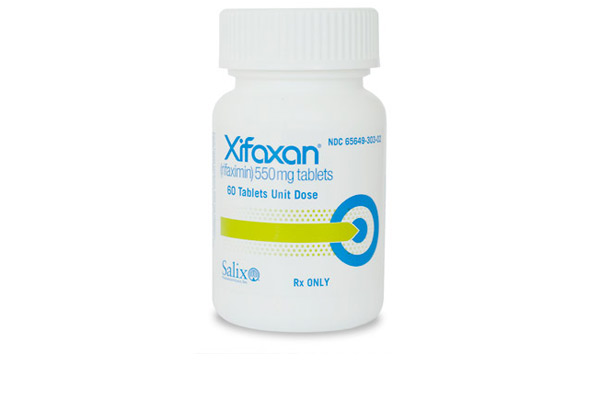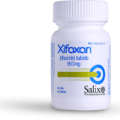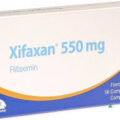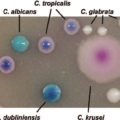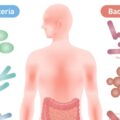Antibiotics are medicines that help stop infections caused by bacteria. They do this by killing the bacteria or by keeping them from copying themselves or reproducing. The word antibiotic means “against life.” Any drug that kills germs in your body is technically an antibiotic. Some antibiotics need to be taken with food and others should be taken on an empty stomach. If you do not take your antibiotics in the right way it will affect how much of them get into your body (their absorption) and therefore they may not work as well.
What is Xifaxan?
Xifaxan is an antibiotic that helps ease gastrointestinal symptoms. It works as an antibacterial (kills harmful bacteria) and may change the make-up of bacteria in your gut in other ways yet to be determined. Xifaxan 200-mg tablets are used to treat traveler’s diarrhea caused by certain bacteria in adults and children at least 12 years of age. Xifaxan 550-mg tablets are used to prevent episodes of hepatic encephalopathy (changes in thinking, behavior, and personality caused by a build-up of toxins in the brain in people who have liver disease) in adults who have liver disease and to treat irritable bowel syndrome (with diarrhea) in adults. Xifaxan is in a class of medications called antibiotics. Xifaxan treats traveler’s diarrhea and irritable bowel syndrome by stopping the growth of the bacteria that cause diarrhea. Xifaxan treats hepatic encephalopathy by stopping the growth of bacteria that produce toxins and that may worsen liver disease. Xifaxan will not work to treat traveler’s diarrhea that is bloody or occurs with fever. Antibiotics such as Xifaxan will not work for colds, flu, or other viral infections. Taking antibiotics when they are not needed increases your risk of getting an infection later that resists antibiotic treatment.
Mechanism of action
Xifaxan interferes with transcription by binding to the β-subunit of bacterial RNA polymerase. This results in the blockage of the translocation step that normally follows the formation of the first phosphodiester bond, which occurs in the transcription process. This in turn results in a reduction of bacteria populations, including gas producing bacteria, which may reduce mucosal inflammation, epithelial dysfunction and visceral hypersensitivity. Xifaxan has broad spectrum antibacterial properties against both gram positive and gram negative anaerobic and aerobic bacteria. As a result of bile acid solubility, its antibacterial action is limited mostly to the small intestine and less so the colon. A resetting of the bacteria composition has also been suggested as a possible mechanism of action for relief of IBS symptoms. Additionally, Xifaxan may have a direct anti-inflammatory effect on gut mucosa via modulation of the pregnane X receptor. SEE: How Fast Does Xifaxan Work
Should You Take Xifaxan With Food?
Xifaxan comes as a tablet to take by mouth with or without food. When Xifaxan is used to treat traveler’s diarrhea, it is usually taken three times a day for 3 days. When Xifaxan is used to prevent episodes of hepatic encephalopathy, it is usually taken twice a day. When Xifaxan is used to treat irritable bowel syndrome, it is usually taken three times a day for 14 days. To help you remember to take Xifaxan, take it around the same times every day. Follow the directions on your prescription label carefully, and ask your doctor or pharmacist to explain any part you do not understand. Take Xifaxan exactly as directed. Do not take more or less of it or take it more often than prescribed by your doctor.
Take Xifaxan exactly as prescribed by your doctor. Follow all directions on your prescription label and read all medication guides or instruction sheets. You may take this medicine with or without food.
For travelers’ diarrhea, Xifaxan is usually taken for only 3 days. For IBS, it is usually taken for 2 weeks at a time. Follow your doctor’s dosing instructions very carefully.
Use this medicine for the full prescribed length of time, even if your symptoms quickly improve. Skipping doses can increase your risk of infection that is resistant to medication. Xifaxan will not treat a viral infection such as the flu or a common cold. Do not share this medicine with another person, even if they have the same symptoms you have.
Call your doctor if your symptoms do not improve after 24 to 48 hours, or if they get worse while using this medicine. Xifaxan does not treat all bacterial forms of travelers’ diarrhea.
Xifaxan dosing information
Usual Adult Dose for Traveler’s Diarrhea: 200 mg orally 3 times a day for 3 days
Usual Adult Dose for Hepatic Encephalopathy: 550 mg orally twice a day
What happens if I miss a dose?
Take the medicine as soon as you can, but skip the missed dose if it is almost time for your next dose. Do not take two doses at one time.
What happens if I overdose?
Seek emergency medical attention or call the Poison Help line at 1-800-222-1222.
Can I take Xifaxan with probiotics?
Probiotics are live microorganisms promoted with claims that they provide health benefits when consumed, generally by improving or restoring the gut flora. Probiotics are considered generally safe to consume, but may cause bacteria-host interactions and unwanted side effects in rare cases. Studies have shown that taking probiotics during antibiotic treatment can reduce the risk of diarrhea, although the two should be taken a few hours apart. Probiotics can also help restore the gut bacteria after antibiotics. READ: Does Xifaxan Kill Candida?
What should I avoid while taking Xifaxan?
Antibiotic medicines can cause diarrhea, which may be a sign of a new infection. If you have diarrhea that is watery or bloody, call your doctor before using anti-diarrhea medicine.
What Are the side effects of Xifaxan?
Remember that your doctor has prescribed this medication because he or she has judged that the benefit to you is greater than the risk of side effects. Many people using this medication do not have serious side effects. This medication may rarely cause a severe intestinal condition (Clostridium difficile-associated diarrhea) due to a type of resistant bacteria. This condition may occur during treatment or weeks to months after treatment has stopped. Tell your doctor right away if you develop: persistent diarrhea, abdominal or stomach pain/cramping, blood/mucus in your stool. Do not use anti-diarrhea or opioid medications if you have any of these symptoms because these products may make them worse. A very serious allergic reaction to this drug is rare. However, get medical help right away if you notice any symptoms of a serious allergic reaction, including: rash, itching/swelling (especially of the face/tongue/throat), severe dizziness, trouble breathing. This is not a complete list of possible side effects. If you notice other effects not listed above, contact your doctor or pharmacist.


